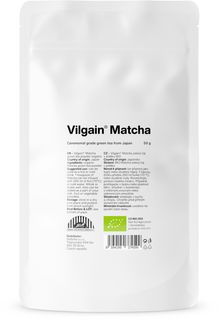What is matcha?
Matcha, also known as matcha, is a type of Japanese green tea known for its typical greenish‑yellow colour, powdery consistency and ritualistic preparation method. Matcha powder is, due to its higher chlorophyll content (caused by the limited access to sunlight before harvesting), rich in amino acids a antioxidants.
Effects of matcha
Matcha powder is especially known as a great stimulant that promotes brain function - attention, memory and reaction. It is characterized by a higher caffeine content compared to classic green tea, but thanks to the L‑theanine content , there is no subsequent drop in energy levels. In addition, L‑theanine has a calming effect and combats physical and mental stress.
Due to its antioxidant effects, matcha consumption has also been linked to the prevention of chronic diseases and cancer, cholesterol regulation and the promotion of overall heart health. Thanks to its EGCG content, matcha green tea may promote fat burning.
Matcha has also found its place in skin care - an easy homemade mask made from matcha powder and water can have a positive effect on acne‑prone or dry skin. In addition, the substances contained in matcha have an anti‑ageing effect.
The side effects of matcha are usually associated with increased caffeine intake - heart palpitations, tremors, indigestion or headaches. It is therefore a good idea to monitor your total caffeine intake per day.
How to prepare matcha
The traditional preparation of matcha tea, without which some cannot imagine consuming it, involves a special bowl in which matcha powder is mixed with hot water. The mixture is then whisked with a unique whisk until a foam is formed. A modern and quick alternative is to prepare matcha in a shaker.
Matcha powder also has applications in baking - candy, cookies, cheesecake - or in the preparation of beverages - try our iced matcha latte.
